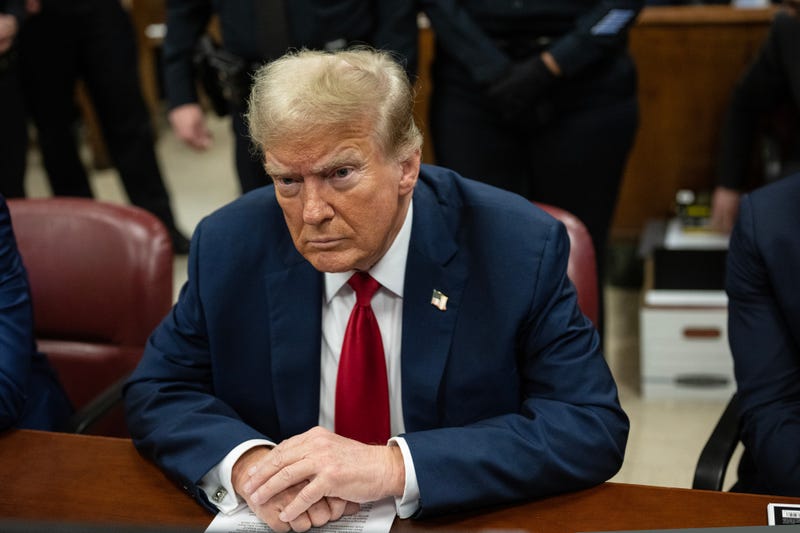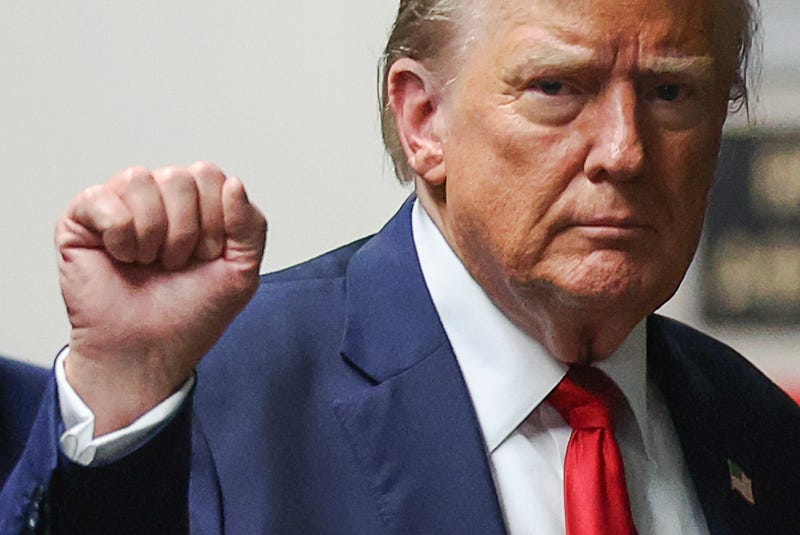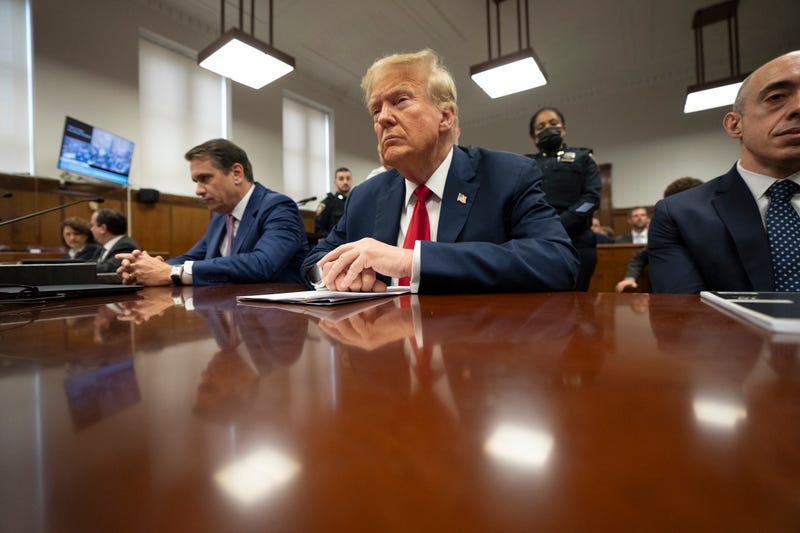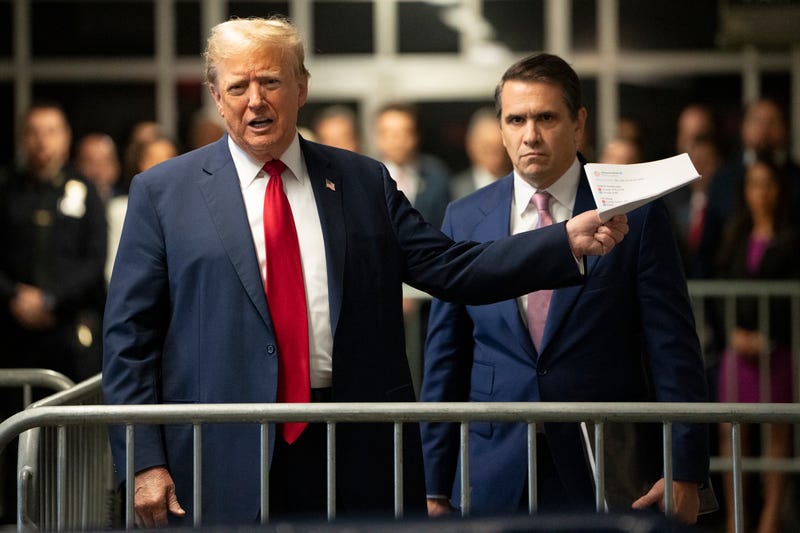
NEW YORK (1010 WINS/WCBS 880) – With prosecutors’ hush money case against Donald Trump barreling toward its end, defense lawyers pressed former attorney Michael Cohen on his criminal history and past lies, trying to convince jurors not to believe the star witness’ pivotal testimony.
4:10 P.M. - The trial has adjourned for the day
Cohen will return on Monday.
4 P.M. - Cohen previously characterized Stormy Daniels payment as extortion
Cohen acknowledged telling a former prosecutor that he felt Daniels and her then-lawyer Keith Davidson were extorting Trump in seeking a $130,000 payment to keep quiet about her claim of a sexual encounter with Trump.
Cohen raised the specter of extortion during a conversation with Mark Pomerantz, who had led the Manhattan district attorney’s investigation of Trump before leaving the office in 2022.
“Yes, I recall making a statement like that … that they were extorting Mr. Trump,” Cohen testified.
“In your mind, there were two choices: pay or don’t pay and the story comes out,” Blanche said.
“Yes, sir,” Cohen replied.
In 2018, Trump decried Daniels’ claims as “false and extortionist accusations.”
In her testimony last week, Daniels denied trying to extort Trump, calling the allegation “false.”
3 P.M. - Cohen’s secret recordings
Blanche suggested Cohen breached legal ethics when he secretly recorded himself briefing Trump in September 2016 about an arrangement to buy the rights of Karen McDougal’s story from the National Enquirer.
“You understand it’s not ethical for a lawyer to record a conversation with their client,” Blanche asked Cohen, who was Trump’s personal lawyer at the time.
Cohen conceded it wasn’t ethical, though he noted there were some exceptions — none of which applied in his case, he said. Cohen had testified that he made the recording so he could play it for the tabloid’s publisher at the time, David Pecker, to prove that Trump was going to make the deal happen.
“Just so I understand, you surreptitiously recorded your client so that you could play a privileged communication for a third party?” Blanche asked Cohen.
The witness agreed.
Cohen had a propensity to secretly record his conversations, though he said the September 2016 talk was the only one he recorded with Trump.
Blanche said many of Cohen’s recordings — about 40 — involved conversations he had with news reporters. Sometimes, the people Cohen was talking to would ask him if he was recording them, and he denied it, Blanche said.
Asked if he recalled that, Cohen said, “It’s not illegal in New York for one party.”
“Mr. Cohen, I did not ask you if you were breaking the law,” Blanche responded. “I just asked you if you were surreptitiously recording people.”
2:30 P.M. Was Cohen going rogue?
Todd Blanche suggested that Cohen acted independently when responding to or issuing statements about various stories. However, Cohen clarified that he always consulted with Trump before making any statements.
Blanche also questioned how Cohen could specifically recall details from a particular phone call given the hundreds he received regularly. He seemed to try and cast doubt on Cohen’s memory of the call. In response, Cohen explained that he could remember the specific call with the help of documents and other evidence. He also mentioned that he had a conversation with Chris Cuomo immediately following the call in question on June 16, though he was unsure of the year.
2:15 P.M. - Back on the stand: Michael Cohen
“Welcome back, Mr. Cohen,” said Judge Merchan. “Let’s get the jury, please.”

12:30 P.M. - The day’s most heated moment involved Stormy Daniels, a disputed phone call and harassing messages from a supposed 14-year-old boy
Blanche sought to unravel Cohen’s claim that he spoke by phone with Trump “to discuss the Stormy Daniels matter and the resolution of it” just days before wiring her lawyer $130,000.
Cohen testified earlier in the week that he called Trump’s bodyguard, Keith Schiller, just after 8 p.m. on Oct. 24, 2016, as a way of getting ahold of Trump because he knew he’d be with him.
But Blanche noted that at the time Cohen was dealing with a spate of harassing phone calls and had exchanged text messages with the supposed harasser just before contacting Schiller.
Blanche cited text message records showing Cohen messaged Schiller at 7:48 p.m. regarding the caller, who’d identified himself as a 14-year-old boy who’d promised not to do it again.
“Who can I speak to about harassing calls to my cell and office,” Cohen wrote to Schiller.
Blanche then cited phone records showing Schiller calling Cohen and leaving a voicemail at 8:01 p.m., followed by a text message stating, “call me,” at 8:02 p.m. Cohen then called Schiller’s number. The conversation lasted 1 minute and 36 seconds, phone records show.
Blanche said Cohen’s claim that he was talking to Trump about the Daniels deal “was a lie because you were actually talking to Mr. Schiller about getting harassing phone calls from a 14-year-old.”
“Part of it was about the phone calls, but I knew that Keith was with Mr. Trump at the time, and it was more than potentially just this,” Cohen responded.
Blanche, his voice growing louder, was incredulous. After hours of slow and halting questioning, he spoke at a rapid clip as his voice rose to a new octave, a note of disbelief in his voice.
“You had enough time in that one minute and 36 seconds to update Mr. Schiller about all the problems you were having with this harassing phone call and also update President Trump on the status of the Stormy Daniels situation?”
Cohen responded that was his belief, based on records he was able to review that he said have refreshed his memory.
“Yes, I believe I was telling the truth.”
“We are not asking for your belief. This jury does not want to hear what you think happened,” Blanche said, even louder, prompting an objection from prosecutor Susan Hoffinger.
12:20 P.M. - Cohen's desire to work in the White House
The defense is now seeking to undermine Cohen’s repeated contention that he had no aspirations to work in the White House following Trump’s election victory.Previous testimony suggested that he was quite upset and angry about this rejection, according to prosecutors. The prosecution seems to be aiming to portray Cohen as so aggrieved by this denial that he sought revenge against Trump.
“The truth is, Mr. Cohen, you really wanted to work in the White House, correct?” asked Blanche.
“No sir,” Cohen replied.
Cohen, however, denied feeling overlooked for various White House roles. He stated that the only position he ever wanted was to be the “personal attorney to the president.”
Blanche then referred to a series of text messages, first presented by prosecutors earlier in the week, showing private conversations he’d had in November 2016. In one message, Cohen texted his daughter that he still had a shot of becoming the president’s chief of staff. Another shows Cohen telling a friend that she could serve as his assistant once he gets the position.
Reiterating his previous testimony, Cohen said that while he may have wanted to be considered as chief of staff for “ego reasons,” he was seeking a role as personal attorney to the president.
“I don’t think you’re characterizing this correctly at all,” Cohen said. “My conversations with my daughter, I wanted a hybrid position where I would still have access to President Trump but I would not be a White House employee.”
11:20 P.M. - Blanche continues to question Cohen over lies and untruths
The defense strongly questioned Cohen about his statements. Cohen said, “I take responsibility but I did not believe it was a crime I should have been charged with.” He has always argued that he shouldn’t have been charged with tax evasion, and this is also stated in his sentencing memo.
Cohen confirmed that he believes the tax evasion charges were wrong, as he wrote in his book Revenge, calling the charges “bogus” and “100 percent inaccurate.” In the book, he explained that he felt he had to plead guilty to protect his wife and family, even though he didn’t think he committed tax fraud.
Blanche pointed out that Cohen had called the federal investigation “the most corrupt investigation in the last 100 years” on TikTok and believed that Judge Pauley, who sentenced him, was “in on it.” Cohen agreed, saying, “I do.”
This questioning was similar to what happened in a previous civil case. There, defense lawyers tried to show that Cohen was a liar who couldn’t be trusted because he had lied to a federal judge during sentencing. Still, Cohen insisted that while he took responsibility, he didn’t think the tax evasion charge was right.
11 A.M. - Blanche focuses on Cohen’s previous under-oath lies
Pivoting from Cohen’s podcasts to his criminal history, Blanche grilled him about his 2018 guilty plea to federal charges, including for lying to Congress about a Trump Tower Moscow project.
As he did when pleading guilty, Cohen conceded on the witness stand that he lied to two congressional committees about his contacts with Russian officials and lied when he said he never agreed to travel to Russia in connection with the project and never discussed with Trump plans to travel to Moscow to support the project.
“Just related to that issue, you lied under oath, correct?” Blanche asked.
“Yes sir,” Cohen said.
10:50 A.M. - Playing audio of one of Cohen’s Mea Culpa podcasts
Trump’s attorneys gave jurors a picture of Cohen’s on-air persona, playing two clips of his podcasts in which he discussed Trump and the potential charges in this case. Defense attorney Todd Blanche has been trying to get Cohen to say that a detective in the DA’s office tipped him off to the indictment before it was unsealed and that the New York Times was tipped off because they had the story. Cohen said he first saw the reporting in the Times and it appears he reached out to the detective.
“I want to thank the DA’s office. I spent countless hours. He’s about to get a taste of what I went through, and it’s not fun. Picture him going through the booking process, getting fingerprinted. It fills me with delight and sadness at the same time.” Cohen is shouting as he says this in the audio clip.
In the recordings played in the courtroom, Cohen’s voice was louder, high-pitched, and much more animated than the reserved and concise way he’s been answering questions. In one clip from an episode Blanche said was from October 2020, Cohen could be heard using an expletive and saying he truly hopes “that this man ends up in prison.”
“It won’t bring back the year that I lost or the damage done to my family. But revenge is a dish best served cold,” Cohen says in the clip. He adds: “You better believe that I want this man to go down.”
Blanche asked Cohen if he continued to call Trump various names on his podcasts and when he did interviews on CNN, and Cohen said he did.
“And that has continued even during this trial?” Blanche asked.
“Correct,” Cohen said.

10:40 A.M. - How did Cohen learn about Trump’s indictment?
Objecting repeatedly, prosecutor Susan Hoffinger disrupted Blanche’s efforts to get text message exchanges between Cohen and investigator Jeremy Rosenberg shown to jurors or read into the record. Hoffinger noted that the messages were heavily redacted, which Cohen then said deprived them of important context.
The messages were from around the time of Trump’s indictment on March 30. Blanche suggested that Rosenberg had confirmed for Cohen that the former president had been indicted, but Cohen said that news was already being reported by the news media. Cohen said he found out from The New York Times.
While the indictment remained under seal until Trump’s April 4 arraignment, the news of the indictment was widely reported. Some reporters even witnessed the moment officials brought the paperwork into the courthouse clerk’s office.
10 A.M. - Michael Cohen back on the stand
Trump lawyer Todd Blanche resumed his cross-examination by asking Cohen about text messages he exchanged with an investigator for the Manhattan district attorney’s office who collected his cell phones as part of the hush money probe.
Blanche started showing Cohen copies of the text messages when a prosecutor interrupted and asked to speak with the judge and defense team at the bench. They quickly conferred to ensure the messages would be shown specifically to Cohen, not the jurors. Questioning subsequently resumed.
Court proceedings have been off to a slow start this morning, with attorneys halting proceedings to conduct several sidebar conversations with the judge out of earshot of reporters, including an extended discussion to start the day.
The stop-and-start continued as Blanche began questioning Cohen and prosecutors objected to the phrasing of several questions, prompting him to start and rephrase. As Blanche continued his questioning, Cohen twice asked Blanche to then rephrase his questions about when he learned that Trump was being indicted, saying he didn’t understand the question. Blanche kept trying and rephrased.
9: 30 A.M. - Inside the courtroom
Court officers are all over the courtroom — two in the center aisle, two behind Trump in the well, more on the side aisles of the courtroom, and many more in the hallway. Secret Service is much more discreet. One agent is standing in the back of the courtroom before Trump even enters. Then three agents walk into court with him and sit in the first row behind him.
Trump’s entourage is the biggest yet walking in with him. His son Eric is here again, along with Matt Gaetz, Lauren Boebert, Anna Paulina Luna, and Bob Good. Alan Garten, the general counsel at the Trump Organization, is also present. Mainstays Eric Trump and Boris are there as well. The entourage totals 14 people today. They get two rows in the front, but there wasn’t enough room, so some of the group is sitting in the last row.
From Hallway Pool Reporters:
Trump entered the hallway at 9:17 and spoke for three minutes, wearing a red tie and flanked by Todd Blanche.
“Outside, if you take a look, it looks like Fort Knox. So many police and they don’t allow people to come. You’re not allowed to have friendly protests, we’re not allowed to have anything here.”
“This was a crime that wasn’t going to be done but when I announced I was running, they wrote it up. They could have done it seven years ago, seven years ago, but they wanted to do it right smack in the middle of the election, very dishonest people have been dealing with.”
“And it’s a shame what they’re doing what they’re doing in terms of suppression. And election interference has never been anything like that. The good news is the polls are through the roof.”
He did not answer questions about whether he will testify, if he’s worried about a conviction, or how he feels about the debate.

9:00 - What to expect today
Defense attorney Todd Blanche is expected to finish his cross-examination on Thursday. Prosecutors might follow up with redirect testimony to address any weaknesses revealed during the cross-examination.
At around 4 p.m., there will be a conference with the judge regarding the defense case.
Reports indicate that two witnesses may testify, but it’s still unclear if Trump will take the stand.
There is no trial on Friday, so the defense will start presenting its case next week.
Since it’s a short week, it’s uncertain if the defense will finish, or if the jury will get the case before the Memorial Day weekend.
However, it seems unlikely that the judge would want the jury to start deliberating before the holiday.
The Associated Press contributed to this report.
